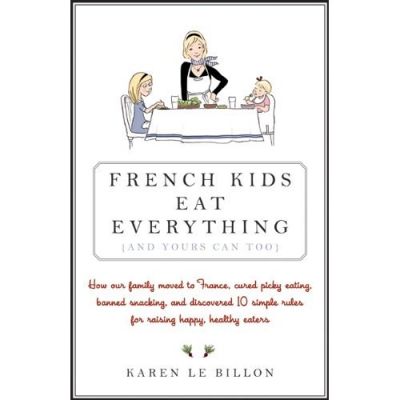 There probably isn’t a parent out there that hasn’t had some sort of grief when it comes to getting their kids to eat. And I’m not even talking about eating vegetables and fruits, it could be anything. According to a new book just out this week, North American parents have it all wrong when it comes to showing kids how and what to eat.
There probably isn’t a parent out there that hasn’t had some sort of grief when it comes to getting their kids to eat. And I’m not even talking about eating vegetables and fruits, it could be anything. According to a new book just out this week, North American parents have it all wrong when it comes to showing kids how and what to eat.
I like to think I was a pretty good kid when it came to eating mostly everything my mom put in front of me. I had very few dislikes: asparagus, squash and cooked carrots; loved raw, hated them cooked. But I was always willing to try something several times before saying, no, just don’t like that. So it’s hard for me to understand kids who won’t touch certain foods, or who scream if one kind of food touches another on their plate, or just flat out refuse to try something new. That’s why I got interested when I heard about a book being published this spring called ‘French Kids Eat Everything, And Yours Can Too‘.
The author is Karen Le Billon, she teaches part of the year at UBC and she spends the other half of the year living in France. She met a Frenchman when she was studying overseas in England, but their children were born in Canada and raised mostly in the North American style of parenting, especially when it comes to food. That all changed when they decided to move to France for a year to see if they wanted to live there full-time. Her two daughters were young, the oldest was four, the other still a toddler, when this all started. She noticed some differences right away…kids there really did eat everything…from green vegetables and fruits all the way to Roquefort cheese. They sat with their parents all the way through the meal and were generally well-behaved, not like her own kids!
That didn’t make her feel that great. When they were just visiting no one really said much to her about how her children ate, but once they were actually living in France it was different. Everyone from her husband to his entire extended family were quietly, and as she writes, ‘sometimes not so quietly’ outraged. So she decided to try to figure out the strategies and philosophies that are employed by French parents when it comes to feeding their children, and this book is the result. She also notes that France’s rate of childhood obesity is one of the lowest in the developed world, so they are obviously doing something right.
Throughout the book she unveils ten ‘French Food Rules’. Number 1 is ‘Parents: YOU are in charge of your children’s food education.’ She explains that the French say children must not be in charge of their own eating, and French doctors, teachers, nutritionists and scientists view the relationship between children, food and parenting in a completely different manner than North Americans…they’ve even assessed the average number of times children have to taste new foods before they willingly eat them, the average is seven but parenting books recommend ten to fifteen tries. French Food Rule #2 is, ‘Avoid Emotional Eating. Food is NOT a pacifier, a distraction, a toy, a bribe, a reward, or a substitute for discipline’. How many times have parents here used food as a bribe or reward???
The rules continue to be revealed throughout the book as Le Billon details in a quite engaging fashion her time spent in France and her efforts to encourage her children to eat more like French children, her successes along with her disasters. At the end of book she summarizes the rules with some practical tips and tricks thrown in, and then there are about 20 recipes for kids that will help you get them used to eating a wider range of foods. So a pretty good package, all in all, backed up with research gleaned from French publications about nutrition and eating habits.
This book is a useful tool, because where else do parents in North America get their information about parenting when it comes to food? Pediatricians, health units, nutritionists? I don’t think there are enough sources out there, and probably those that are out there are underutilized because parents don’t take the time to take advantage of available programs and information. These food-related behaviours are not something kids will learn at school, in the book Karen Le Billon stresses that you have to get kids to start enjoying a wide range of foods before they are even two years old. I have a friend who is a pediatric nutritionist, and she spends some of her time at a health unit in Vancouver teaching parents about what they can feed their kids. We once did a radio show together in which she revealed that babies actually start craving some stronger flavours in their food by the time they are just over a year old…so you can start introducing some spices and herbs in their foods…it turned out to be one of my most popular radio shows ever, so that told me more info is needed. If you want to try some of Karen’s recipes she suggests in the book, visit this page on the Bon Appetit website. And if you want to listen to my chat with Jo-Ann Roberts on All Points West regarding the French Kids Eat Everything, just click here.
I just read another story about a study in the journal, Public Health Nursing. The study evaluated nearly 400 low-income women with children ages 1-3 enrolled in Early Head Start programs. The research results indicated toddlers were less likely to consume fruits and vegetables four or more times a week if their mothers did not consume that amount or if their mothers viewed their children as picky eaters. So, low income, low education can result in poor eating habits and that really impacts a child’s development as they grow up, so a few things to think about as you prepare dinner for your children tonight. And I’d love to hear some strategies our listeners employ to get their kids to try new foods.


